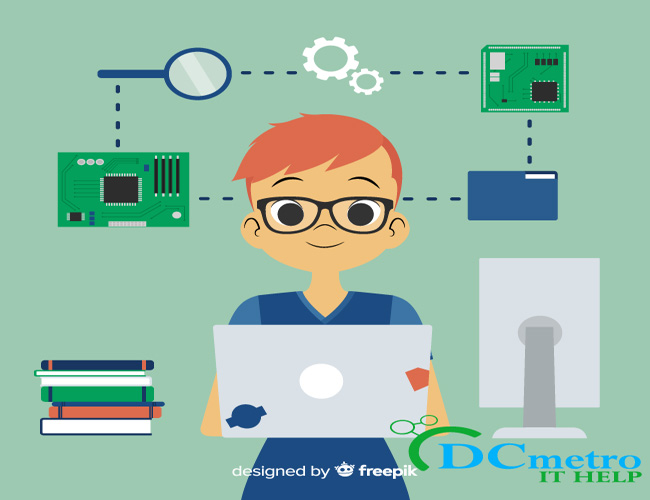In the ever-evolving digital landscape, information technology (IT) technicians serve as the backbone of organizations, providing crucial technical support and expertise. From troubleshooting software issues to managing network infrastructure, these skilled professionals play a pivotal role in ensuring the efficient operation of IT systems. In this article, we will explore the responsibilities, skills, and significance of an IT technician in the modern era..
Contact us 202-810-7755 today to learn more about Technology Technician. Please contact us to get Technology Technician for your business or if you have any questions or concerns.
DC Metro IT Help
The Responsibilities of an IT Technician:
IT technicians, also known as IT support specialists or system administrators, undertake a wide range of responsibilities to ensure the smooth functioning of IT systems. Their core tasks include:
- Technical Support: IT technicians provide frontline support to end-users by addressing technical queries, troubleshooting software and hardware issues, and resolving technical glitches. They assist users in understanding and utilizing computer systems effectively.
- Network Administration: IT technicians are responsible for managing and maintaining network infrastructure. This includes configuring routers, switches, and firewalls, monitoring network performance, and troubleshooting connectivity problems.
- System Maintenance and Upgrades: IT technicians perform routine maintenance tasks, such as applying software updates, installing patches, and upgrading hardware components. They ensure that systems are up to date and running smoothly.
- Data Security and Backup: IT technicians implement security measures to protect sensitive information from unauthorized access and cyber threats. They conduct regular data backups and develop disaster recovery plans to ensure business continuity.
- IT Infrastructure Planning: IT technicians collaborate with other IT professionals to plan and implement IT infrastructure projects. They assess technology requirements, recommend hardware and software solutions, and ensure seamless integration into existing systems.
Skills Required:
Being an IT technician demands a diverse skill set, combining technical expertise, problem-solving abilities, and effective communication. Here are some key skills necessary for success in this role:
- Technical Proficiency: IT technicians need a strong understanding of computer hardware, operating systems, networking protocols, and software applications. They should stay updated with emerging technologies and industry trends.
- Troubleshooting Skills: An analytical mindset and strong problem-solving abilities are essential for diagnosing and resolving technical issues. IT technicians should be adept at investigating symptoms, identifying root causes, and implementing effective solutions.
- Communication and Customer Service: IT technicians must possess excellent communication skills to interact with end-users who may have limited technical knowledge. They should be able to explain technical concepts in a clear and concise manner and provide friendly and patient customer service.
- Time Management: IT technicians often handle multiple tasks simultaneously and must prioritize effectively. Strong time management skills enable them to meet deadlines, respond promptly to user requests, and ensure efficient operations.
- Continuous Learning: The IT field is constantly evolving, and IT technicians must be eager to learn and adapt to new technologies. They should actively pursue professional development opportunities to enhance their skills and stay up to date with industry advancements.
Significance in the Digital Era:
IT technicians play a crucial role in the digital era, enabling organizations to harness the full potential of technology. Here are some key ways IT technicians add value:
- Enhanced Productivity: By providing technical support and resolving IT-related issues promptly, IT technicians ensure uninterrupted workflow and increase productivity for individuals and organizations.
- Cybersecurity and Data Protection: IT technicians implement security measures to safeguard networks, systems, and sensitive data from cyber threats. Their expertise in data backup and recovery ensures that valuable information can be restored in the event of system failures or data breaches.
- System Efficiency and Performance: Through regular maintenance, upgrades, and optimization, IT technicians ensure that IT systems operate efficiently and deliver optimal performance. This translates into faster response times, improved user experiences, and reduced downtime.
- Business Continuity: IT technicians play a crucial role in developing and implementing disaster recovery plans to minimize downtime and ensure business continuity in the face of technical failures or natural disasters.
- Technological Advancements: By staying up to date with emerging technologies, IT technicians contribute to the strategic planning and implementation of innovative IT solutions. Their insights and expertise help organizations leverage new technologies to gain a competitive edge.
In the digital era, IT technicians are the backbone of organizations, providing essential technical support and expertise. Their responsibilities range from troubleshooting software issues and managing networks to ensuring data security and optimizing system performance. As technology continues to advance, the significance of IT technicians will only grow, making them indispensable contributors to the efficient and secure operation of IT systems in today’s digital landscape.



Leave a Reply